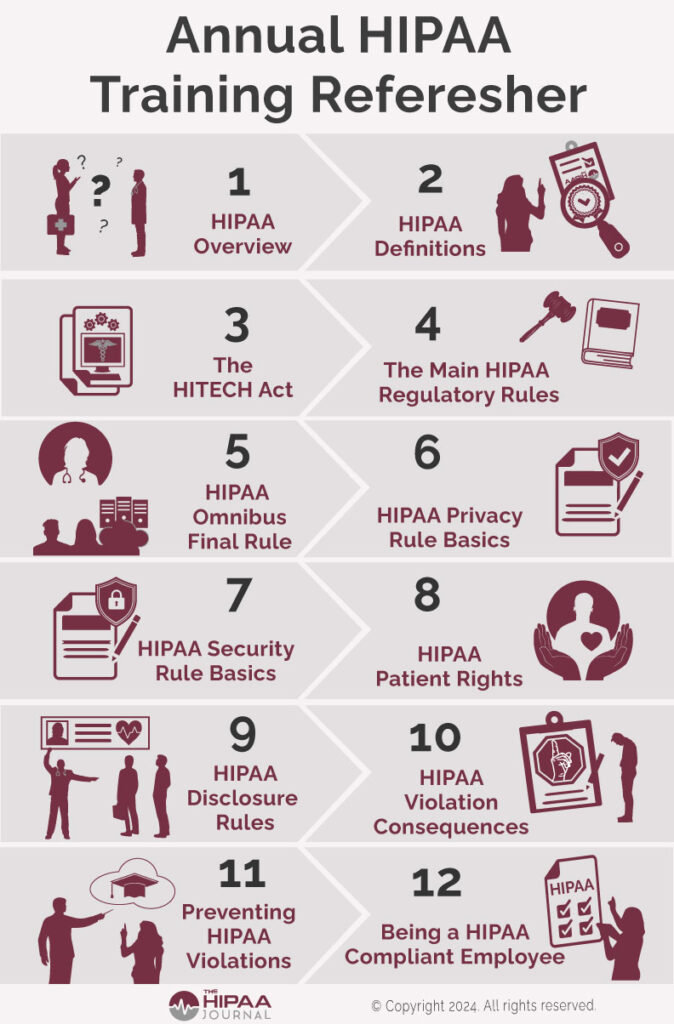How Long Is HIPAA Training Good For?
HIPAA training is good for one year because HIPAA training should be completed annually to ensure best practice compliance with evolving regulations and organizational policies, though the frequency can vary depending on specific job roles, updates in HIPAA laws, or organizational requirements. New members of the workforce who will have access to Protected Health Information (PHI) are mandated by law to receive HIPAA training to ensure compliance with privacy and security regulations. The HIPAA Privacy Rule and HIPAA Security Rule each have HIPAA training requirements for entities handling PHI.

The HIPAA Privacy Rule Training Requirements
Under the HIPAA Privacy Rule, training is mandated for all workforce members of covered entities and business associates who handle or have access to PHI, ensuring they understand how to maintain the confidentiality and security of this sensitive information. This includes education on the proper use and disclosure of PHI, the rights of individuals under HIPAA, and the entity’s privacy policies and procedures.
The HIPAA Privacy Rule states that “a covered entity must train all members of its workforce on the policies and procedures with respect to protected health information”. The frequency of training is specified “as necessary and appropriate for the members of the workforce to carry out their functions within the covered entity”, which is generally interpreted as being at least annual refresher training for all members of the workforce.
The HIPAA Security Rule Training Requirements
The HIPAA Security Rule specifically focuses on training regarding electronic PHI (ePHI), emphasizing the importance of securing electronic health records and other digital forms of PHI. It requires that all members of the workforce are trained on the entity’s security policies and procedures, the handling of ePHI, and awareness of potential security threats.

Accredited HIPAA Compliance Training
HIPAA Journal Recommends ComplianceJunction
Used By 1,000+ Healthcare Organizations & 100+ Universities
HIPAA Training For Individuals ‐ HIPAA Training For Universities
The HIPAA Security Rule states covered entities and business associates must “Implement a security awareness and training program for all members of its workforce (including management).” The inclusion of the word “program” implies securely awareness training is an ongoing requirement rather than an annual or periodic requirement.
The Timing of HIPAA Training for New Hires
Both the HIPAA Privacy Rule and the HIPAA Security Rule require that HIPAA training be provided to new members of the workforce within a reasonable timeframe after hiring, and thereafter as needed, typically annually, to ensure staff are up to date with the latest regulations, technologies, and threats to PHI privacy and security.
The aim of the HIPAA training requirements is to create a knowledgeable workforce that contributes to the prevention of unauthorized PHI disclosures and enhances the overall protection of patient privacy and data security. It is a general best practice that new employees receive HIPAA training as soon as possible.
The Frequency of HIPAA Training Thereafter
While it is a best practice to provide HIPAA training annually, it may be necessary to increase the frequency of HIPAA training when workforce responsibilities increase, HIPAA laws are updated, or a “material change” occurs in an organizational policy or procedure. It may also be necessary to increase the frequency of HIPAA training if a risk assessment identifies the need for additional training.
HIPAA training can be provided to a group or to an individual as considered necessary. Generally, group training is sufficient to meet the HIPAA training requirements. However, if training is applied as a sanction for violation to a HIPAA policy, it is most often provided to members of the workforce individually – the exception being when a culture of non-compliance has developed due to members of the workforce taking shortcuts “to get the job done”.
HIPAA Violation Penalties for Training Failures
When HIPAA violation penalties are announced by HHS’ Office for Civil Right, the penalties usually refer to the “headline” violation (i.e., a data breach) rather than the underlying causes of the headline violation (i.e., failure to conduct a thorough risk assessment, failure to provide adequate training, failure to monitor compliance, etc.). However, by reading the resolution agreements, it is possible to identify HIPAA violation penalties for training failures.
- In 2023, St Joseph’s Medical Center agreed to an $80,000 penalty for disclosing PHI to reporters during the COVID-19 pandemic. As the disclosures were attributable to lack of Privacy Rule knowledge, the workforce had to undergo HIPAA training as part of the corrective action plan.
- In 2020, it was announced that Athens Orthopedic Clinic had agreed to a $1.5 million settlement to resolve multiple HIPAA violations including that the clinic had not provided Privacy Rule training to any members of the workforce prior to 2018.
- In 2019, West Georgia Ambulance Inc. agreed to a settlement of $65,000 to resolve violations of HIPAA that included the failure to conduct a risk analysis, implement security policies and procedures, and provide security awareness training.
Documenting HIPAA training helps in proving compliance with federal requirements, reducing the risk of legal issues or fines during audits. Training records are useful for confirming that new hires and staff with access to PHI are properly trained. Training records also allow organizations to track and manage their employees’ training, identifying areas that need further education and ensuring everyone is up to date with current HIPAA rules.




